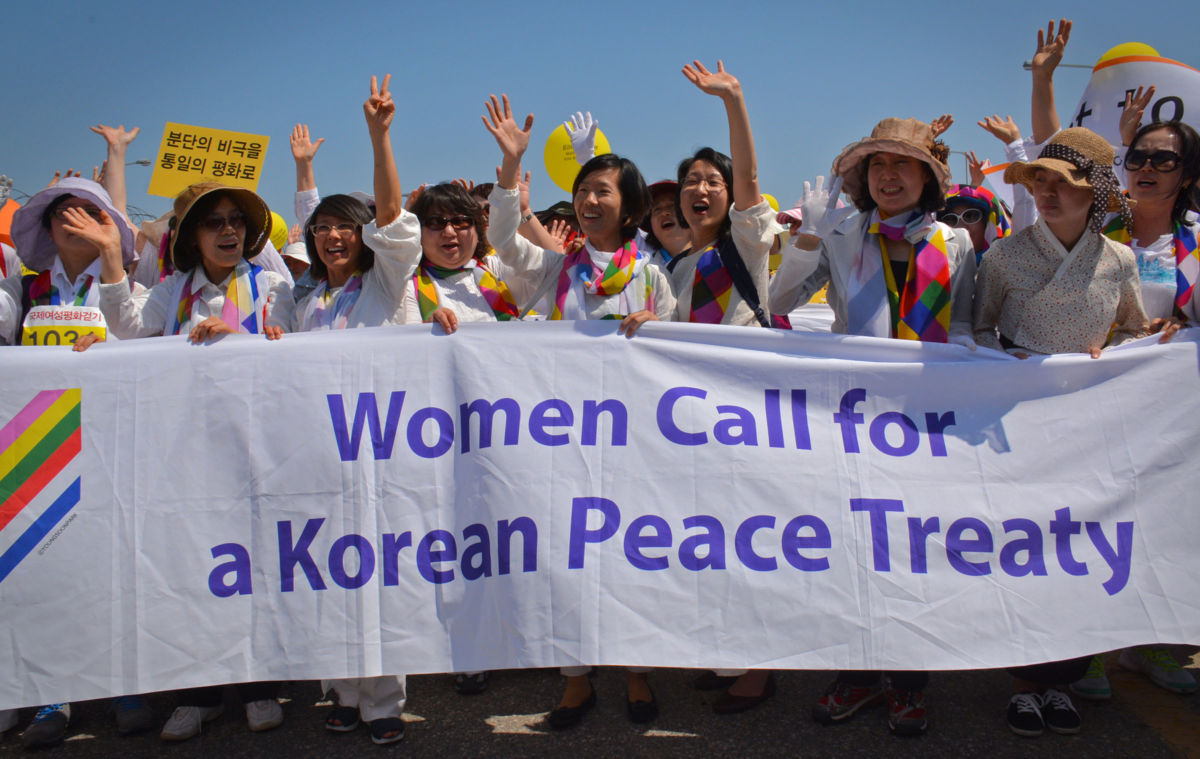NOVANEWS
 Women peacemakers march in Paju, South Korea, after crossing the demilitarized zone on May 24, 2015, for the International Women’s Day for Peace and Disarmament.STEPHEN WUNROW
Women peacemakers march in Paju, South Korea, after crossing the demilitarized zone on May 24, 2015, for the International Women’s Day for Peace and Disarmament.STEPHEN WUNROW
When the meeting between U.S. President Donald Trump and North Korean Chairman Kim Jong Un ended abruptly in Hanoi two weeks ago, my heart sank. As a Korean-American, I have been working for nearly two decades to end the Korean War, which has kept Koreans living under the constant threat of war and devastated three generations of Korean families. I had traveled to Hanoi with a delegation of women peacebuilders to celebrate what many Korea experts anticipated — that the two leaders would declare an end to the Korean War.
Instead, talks collapsed and now the Trump administration has returned to its rhetoric of “maximum pressure,” specifically arguing that there will be no progress on peace and lifting of sanctions without North Korea’s denuclearization. While it is important to understand why the talks failed, it is even more important to outline the constructive steps that the United States and North Korea must take to formally end the Korean War and negotiate a peace agreement — as they were supposed to do within three months of signing of the Armistice agreement in 1953. The United States has an unprecedented opportunity to bring closure to Koreans and Americans wanting a decisive end to this nearly 70-year war. To ensure that this opportunity isn’t squandered, a delegation of South Korean women parliamentarians and civil society activists is traveling to Washington, D.C., this week to meet with members of the U.S. Congress to press for the conclusion of the Korean War. The success of this effort hinges on one overlooked factor: women’s inclusion in the Korea peace process.
Instead, talks collapsed and now the Trump administration has returned to its rhetoric of “maximum pressure,” specifically arguing that there will be no progress on peace and lifting of sanctions without North Korea’s denuclearization. While it is important to understand why the talks failed, it is even more important to outline the constructive steps that the United States and North Korea must take to formally end the Korean War and negotiate a peace agreement — as they were supposed to do within three months of signing of the Armistice agreement in 1953. The United States has an unprecedented opportunity to bring closure to Koreans and Americans wanting a decisive end to this nearly 70-year war. To ensure that this opportunity isn’t squandered, a delegation of South Korean women parliamentarians and civil society activists is traveling to Washington, D.C., this week to meet with members of the U.S. Congress to press for the conclusion of the Korean War. The success of this effort hinges on one overlooked factor: women’s inclusion in the Korea peace process.
Why Talks Collapsed in Hanoi
Instead of declaring an end to the nearly 70-year Korean War, the two sides cut their meeting short and left without any concrete commitments. In a brief press conference before departing Hanoi, Trump explained that the fault line was over sanctions: “Basically, they wanted the sanctions lifted in their entirety, and we couldn’t do that,” he said. “They were willing to denuke a large portion of the areas that we wanted, but we couldn’t give up all of the sanctions for that.” He added, “But sometimes you have to walk, and this was just one of those times.”
READING LIST
ENVIRONMENT & HEALTH
Are the Fossil Fuel Industry’s Days Numbered?
POLITICS & ELECTIONS
“Speaking Truth to Power” Is No Substitute for Taking Power
PRISONS & POLICING
Most Victims of Violent Crimes Don’t Call the Cops
ECONOMY & LABOR
Will New Mexico’s Historic Labor Win Spark Change in Other States?
PRISONS & POLICING
California Moratorium Impacts a Quarter of People on Death Row in US
EDUCATION & YOUTH
Admissions Scandal Goes Beyond Arrestees — It Indicts Entire System



